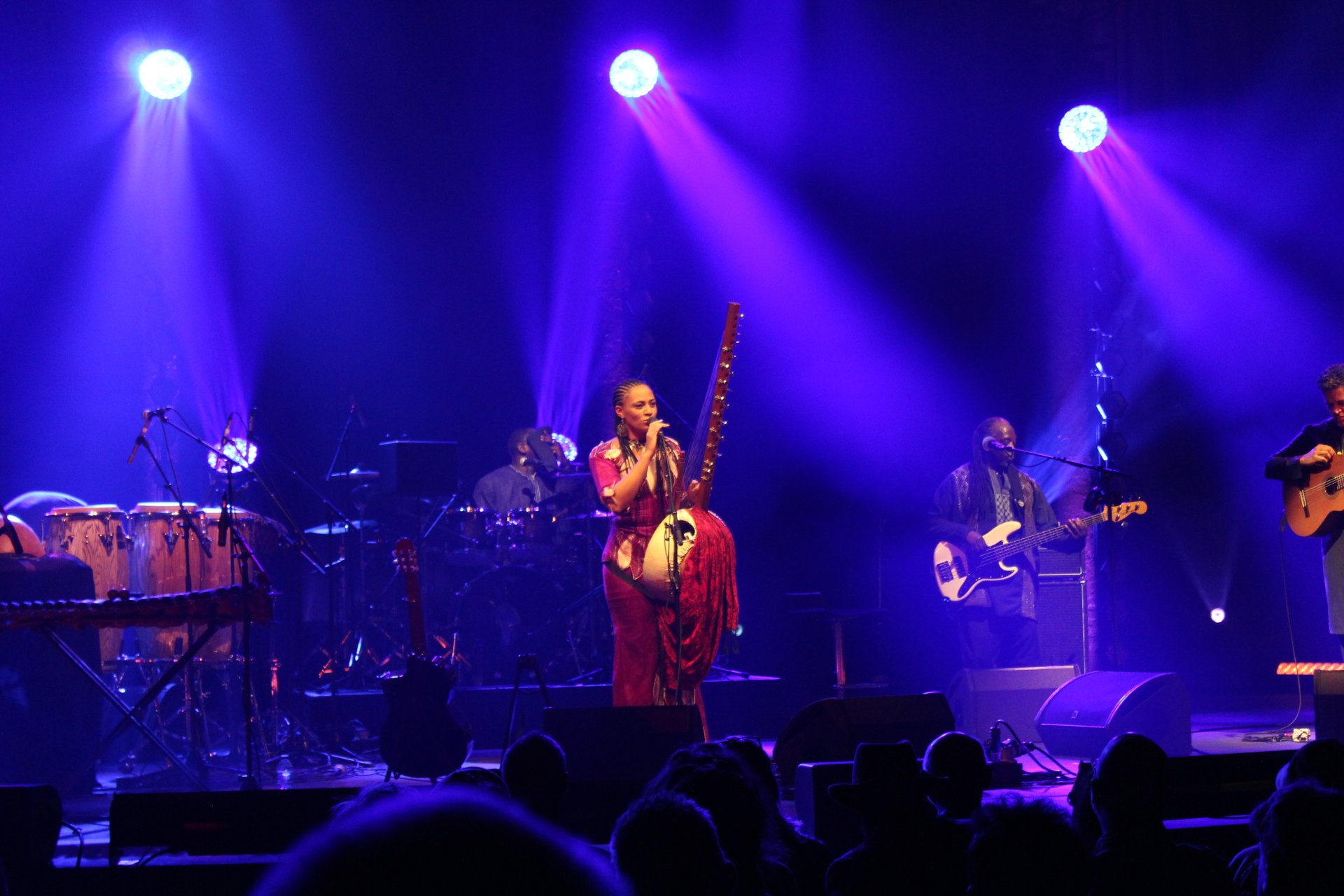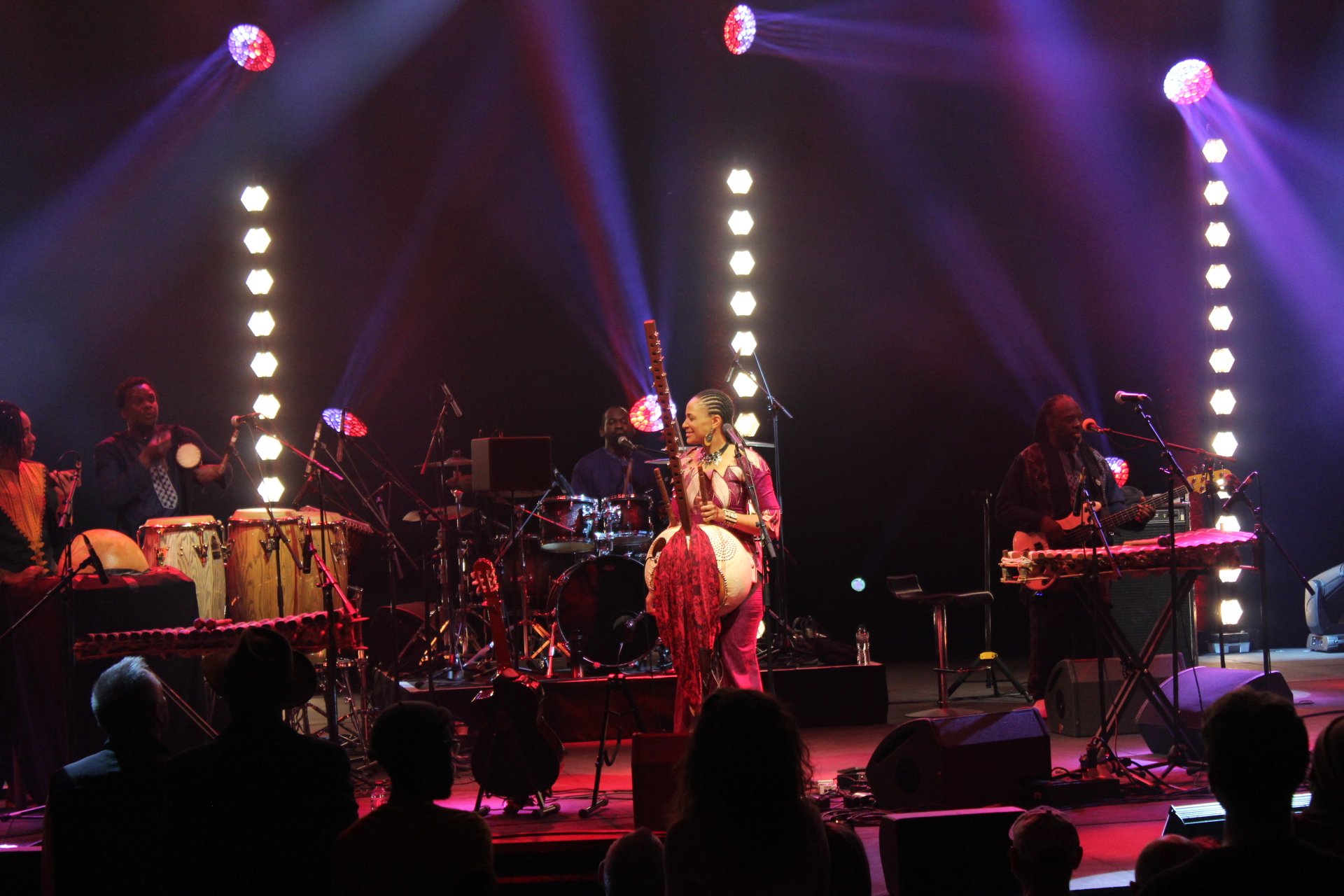The Musician, The Mother and The Myth: Sona Jobarteh
Image: Elizabeth Bisuga
On a Sunday evening in North London’s Roundhouse, I sat in the audience amongst an intimate sea of faces. I almost found it hard to comprehend that I was soon to be in the presence of such an ancient musical tradition, and that I happened to exist at the perfect moment to see its first professional female player in its 700 year old history.
Maya Sona Jobarteh, or Sona Jobarteh as she is more commonly known, is from a prominent kora-playing griot family, and is the first professional female kora player in its known history. Dating back to the 13th century, the kora is most prominently used within West Africa and is an important element of the Mandingo peoples. Its playing is reserved only to certain families called ‘griot’. Traditionally, the 21-stringed harp-like instrument is passed down from father to son, but Sona Jobarteh is the first empowered woman in her lineage to play the instrument at a professional level.
Image: Elizabeth Bisuga
During the short intervals between sets, Sona would address us and in her soft, bird-like voice - she shared stories, one of which being her battle with identity and what it means to her to carry on this oral tradition. Sona is of mixed heritage, born to a white British mother and Gambian father; she reflects both an insider and outsider within her own traditions. Growing up, when she was in England with her mother, she was taught to play the classical cello, harpsichord and piano at a music school: when she was with her father, she learnt to play the kora and other traditional Gambian instruments. Many children of the diaspora can relate to this tale of feeling both an insider and outsider within your own cultural identity, of wanting to learn more and to feel a connection to a side of you that, at times, feels so far away both in land and spirit. Luckily for Sona, she has been on a journey that taps into both her heritage and musical abilities to fill this void.
However, Sona’s intersectional relationship with tradition is more complex than just that of mixed heritage. During another interval, Sona shared her new album “Badinyaa Kumoo” and it’s meaning ‘the mother’:
“It’s about the mother’s side and paying homage to the fact that I am a mother and what the mother figure symbolises in this tradition… in terms of bringing people together… and the investments in our generations to come.”
Image: Elizabeth Bisuga
Being both a mother and griot means that Sona has a particularly complex but kindred role within her family and community. Her griot heritage means that she must continue the teachings and traditions of her people for the next generation (which would usually be ascribed to her son and other young boys willing to learn the kora). This would be the first echo of a paternal tradition being taught by a mother to her son in the similar way that her father Sanjally Jobarteh (another notable kora player) taught her. This led me to question the role of traditions and how, in this season of rapid change, can easily evolve with modern times; how it only takes one “moderate” thinker like Sanjally to alter what we see as tradition. In many places around the world it is believed that women uphold the culture. Within certain ethnic groups and even some religions, matrilineality is practised and the women within those communities are entrusted to uphold and continue the traditions, stories and evolution of their people. So this poses the question, in our post-pandemic society, why isn’t there more of a push for this type of matriarchal living within wider communities? Short answer, patriarchy. Oh and of course, capitalism - duh. The structures that once held strong are being dissolved in revolutionary creative spaces like these, and I had an opportunity to witness renewed ways of being, unlearning and progress through storytelling.
Sona also spoke on the 50th anniversary of Gambia’s independence and how it ties to the work that she does in the continent, specifically within her school, The Gambia Academy. From their website, the academy is “the first institution in the Gambia to educate young Africans in their culture, traditions, and history seamlessly alongside their everyday academic education.” It is, as Sona candidly admitted, the first of its kind, which places the culture and traditions of Africa at the centre of its curriculum, to which she hopes will instil not only education but a sense of pride and purpose for the students:
“Political independence is just one part of it, the bigger part for me is mental independence...”
Image: Elizabeth Bisuga
It’s here where the connection of mother and musician meet for Sona. The musician preserves the stories and practices of a community’s lineage through song, whilst the mother shares it with all of her children, whether they be boys or girls. It’s also at this intersection where I see the more traditional role of the mother, especially an African mother, take place. Women in West African societies are often viewed through the lens of marriage and motherhood; the well known proverb, “it takes a village” is deemed more a matter of fact rather than a saying back home. With all the children in Sona's academy, I can’t help but think how she’s evolved this traditional outlook of the mother and fused it with her role as griot to help create a new model of education and being for young Africans.
Sona Jobarteh represents so much more than being the first known female kora player: she represents the future of music and African education, and is a stunning example of why some traditions need to be broken in order to be restored.
For full details on upcoming events at The Roundhouse, see here.




